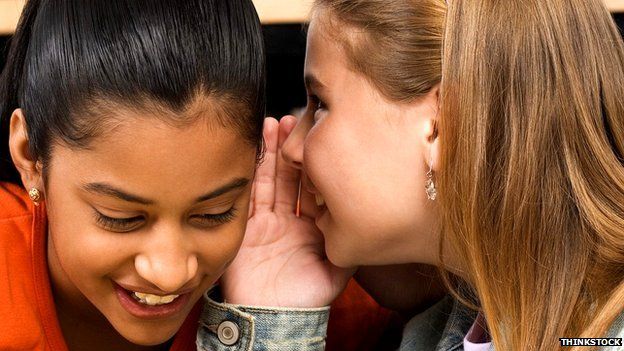Should children have best friends?
- Published

A head teacher of a leading primary school has said young children should not have best friends because it could leave others feeling ostracised and hurt. But are people programmed to have best friends?
Besties, BFFs - whatever you want to call them, best friends make the world go round for many people.
Plenty of children naturally seek out a special friend and the childhood pal is a constant motif in children's literature - Tom Sawyer and Huckleberry Finn or The Wind in the Willows' Ratty and Mole.
So it may come as a surprise to many that parents of children at a private day school in south-west London have been told it's not good for their offspring to have best friends.
Instead they should be encouraged to have "lots of good friends" to avoid overly possessive relationships and upsetting fall-outs, head teacher Ben Thomas was quoted by the Daily Telegraph as saying.
It's not the first time schools have suggested a "no best friends" policy.
Last year, Gaynor Sbuttoni, who provides counselling for children in London, said it was increasingly common for teachers to encourage pupils to play in large groups instead of developing tight-knit bonds.
But do we need best friends?
Humans, and children in particular, naturally find themselves forming special friendships, according to relationships expert Judi James.
"Children have usually had extensive bonding with at least one parent, so when they first go to school, they are used to being part of a double act, so it's only natural that they want to seek out a best friend.
"It's probably a bit of fear and a survival instinct. It makes them feel more secure, it's easier to face the world when there are two of you and it validates your behaviour, and who you are," she says.
But James thinks having a best friend is just as much an adult instinct as a child's.
"The term 'best friend' is more important to children - and girls use it more than boys - but as we get older, we give special relationships different labels.
"When people get married, they refer to them as their other half, their wife, or their husband. But most couples say their best friend is their partner," she argues.
For philosopher Mark Vernon "friendship is an issue in a culture of democratisation".
"There is a tension as we are not designed to be democratic in that way - to love everyone equally. It's human nature to seek an intimate relationship," says Vernon, author of The Philosophy of Friendship.
He thinks there is "something tyrannical" about saying someone can't have a best friend, and there's nothing wrong with children having a best friend, as long as that friendship isn't based on excluding or rejecting others.
The idea some children will suffer if playground cliques are allowed to continue unchecked has vexed educationalists for some time.
It's not just an issue in the UK. In 2010, the New York Times reported there was trouble ahead for the classic best-friend bond, after a number of schools and summer camps had signalled their intent to discourage children from pairing up.
Critics say banning best friends to ensure that no-one is left out prevents young people from learning about the ups and downs of life.
"If children are stopped from getting these negative experiences, they will end up being emotionally stunted - they need to learn to cope with being snubbed and other normal emotional experiences," says Dennis Hayes, professor of education at the University of Derby.
Part of the problem is people are looking at their own experiences, like break-ups and divorces, and making the mistake of treating children's emotions as if they were adults, he argues.
And by putting the spotlight on the negative aspects of close friendships, such as the friendship breaking down, adults are simply exaggerating day-to-day experiences.
Hayes recognises it's important a teacher has a "chat with children in the corridor" if they are experiencing problems. But, beyond that, he thinks there shouldn't be too much intervention.
"The danger is if adults direct everything, children will be less able to form their own relationships in later life," he says.
James agrees there's nothing wrong with children having best friends.
"It's more a case of needing another word for 'best friend'- something that doesn't imply others are 'worse', and is more inclusive," she says.
In the end, she thinks it comes down to having an optimistic outlook.
"If we buy our child a pet, there's a likelihood it will die, but we want them to be able to form a bond with an animal. We get married knowing it could end in divorce.
"Yes, a child might fall out with their best friend, they might get jilted, their best friend might move away - but that's not a reason to keep relationships at arms length. Children have to learn to survive socially," she says.